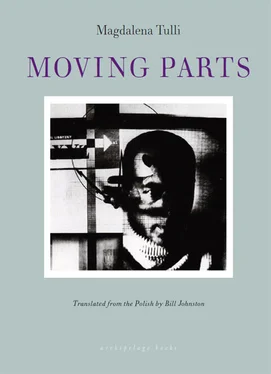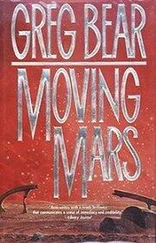The narrator could assert that he saw with his own eyes the events that took place in the hotel lobby, and likewise the arrival of the cab. He watched them through the glass panes, over a beer, which at his request had been brought to him in the dining room, even though the tables were already being cleared after breakfast. But how was it with the interior of that room on some floor or other? This is a critical question, assuming the world actually exists, and does so reliably enough that we should not consider ourselves entitled to discuss uncertainties. And could the narrator drink his beer if the world didn’t exist? But in fact he didn’t drink it at all. He merely watched the foam settling in the mug.
There now reappears the question of the rolls that the other two spread with butter not so long ago: it would be nice to know for certain that they at least actually existed. The narrator smirks when the word actually moves full sail into the dangerous straits that have emerged between the image of the rolls and the period. In order to eat the rolls one must have a body — it’s as simple as that. Body and rolls are of the same substance. There’s no need whatsoever to concern oneself with what that substance is; it’s enough that there is someone to name the one and the other — and thus the narrator pulls out of his ear an egg that he had only just put in his pocket, and takes a bow. The body is indifferent to this entire matter. Naive and simple-hearted, it wants only to experience good; it desires nothing but comforts and pleasures, and that is why sofas sink so softly and caressingly beneath its weight, and why cream is served with coffee. On the other hand, that which is called life demands impossible positions of the body. It requires monkeylike agility for climbing masts; it requires crawling on one’s knees with a scrubbing brush across the planks of the deck, in gleaming white dress shirts, in jackets on which there is not to be a single speck of dust, nor drop of brine. What torture it is to sail day after day in the fog of the present tense. Subjects and predicates welter in it devoid of outlines, drifting without goal or direction. Until they are stopped by a period at the end of a sentence, everything still seems possible; every unexpected “therefore” opens the sluice gates to seas of subordinate clauses, to narrows of ironic meanings, to foreign ports of perverse conclusions in which the last word casts doubt on the first, like a customs official boarding a ship at the end of its voyage and looking for any pretext to question the bills of lading and discreetly pocket a wad of crumpled banknotes. The fog lights of adverbs and complements summon one fragment after another from the hazy background; let’s look for instance at a bright smudge of red moving through the grayness of an autumn afternoon. It’s a red umbrella, which a fourth character is just about to fold with a snap. The narrator hopes that at this point he’ll finally be able to put his foot on the dry land of the past tense, in the kingdom of certainty where facts live and flourish. Only there do they flourish, nowhere else; the past tense is their entire world, the homeland of truths that are incontrovertible though, it must be admitted, usually contradictory.
Up until now the narrator has been given no opportunity to speak with someone in authority who would have a better idea where this story is heading; and so the course of events takes him by surprise time after time. Having no binding agreement to rely on, he had wished that three characters would be the end of it, but it was not in his power to insist. And so the figure with the umbrella is crossing a damp terrace covered with dead leaves. It’s still the same November. Somewhere in the corner, garden furniture has been stacked in a soggy pyramid. The torpor of autumn has deprived its forms of lightness. Raindrops tremble on the upturned backs of chairs; the fancy cast-iron legs jut skyward. The season is over, and nothing more will happen; as for the next one, no one knows if it will ever come. The whole property is for sale, and has already been assigned a number in the listings of the real estate agency; the description is accompanied by a photograph in which the succulent green of the trees stands out against a cream-colored facade. Under the heading ‘garden’ is frozen the mute echo of bursts of laughter at a table adorned with red wine stains and lambent patches of sunlight filtering through the glass tableware. By the gate next to the bell push a metal nameplate of no use to anyone has been put up; never mind what it says. The narrator will ignore the first letter of the surname; he’s already grown tired of the game involving initials. When the key grates in the lock, an empty interior will open wide to reveal white walls and ceilings; a staircase will lend the space depth. Rectangular marks on the wall are mementos of frames that must have held pictures; but of what? The punctured remains of a colored rubber ball will be lying in the corner beneath the stairs, until the sale of the house summons new owners; but this is foreordained, and so the floor will seem to show through the rubber integument. The lighter things are, the easier it is for them to disappear, as if they were blown away by a gust of wind produced by the difference in air pressure between future and past tenses; in recesses they last longer. It would seem that when buying, for instance, such a solid thing as a grand piano, one could count on its weightiness, on the boundless durability of its black lacquer, and on the immutable laws of harmony. But it was placed, as sometimes happens, in a draft, and so the piano passages, volatile shoals of triads that cannot entirely be taken seriously, died away first, before the murmur of voices, and even before the smell of coffee had dissipated. The perfection of a silence capable of containing all sounds will no longer soothe any ear. The furniture has vanished, along with a colorful mist in which life was pleasant and imposed no thoughts about its direction or its meaning. Even the umbrella stand has gone, and so water drips onto the floor, onto the perfectly maintained beechwood tiling, while the female figure turns in her hands an envelope taken a few moments ago from the mailbox. It can be surmised that the trick involving the juggling of passions worked perfectly for her for a very long time; the golden balls of love, jealousy, and longing, obedient in her hands, passed through the emptiness of the spheres as they described their giddy, collision-free double and triple trajectories high over the depths of despair, far from the misery of ruination, leaving no trace other than streaks of light. Ink can stain; a mark has been imprinted on her index finger. It’s a capital F from the last name of the addressee, turned back to front. Stubborn, it managed after all to find a way to appear. The first letter of the sender’s name, also smudged from the dampness, tries to squeeze into the next sentence, but without success. The forwardness of these capital letters has gone too far, thinks the narrator. In any case the woman still tears the envelope into shreds, along with its contents. Now she needs to get rid of the pieces and doesn’t know what to do with them; she ought to throw them into the toilet and flush them away. After all, she must know where the bathroom is. While she’s at it she ought to put the red umbrella in the bathtub. But whatever she does now, it will not satisfy the narrator, who has already allowed the insidious word ‘ought’ to take control, peremptorily imposing its weight on the sentences. And thus, because of the last name beginning with F, probably her husband’s, out of wifely loyalty she ought to stick to the metaphor of life as a sea voyage, and especially avoid the circus images associated with the character in the black sweater. Either way, little here depends on the opinions expressed by the narrator. All he can do, and that only to a certain degree, is to govern grammatical forms, an essential element, especially as concerns the verbs, which are constantly striving to escape into open space, of their own accord taking on the forms of the future tense, without any obligations. Brought forcibly down to earth, while they still can they steer clear of perfective forms; they thrash like kites and drift toward waters into which one cannot step twice, and even at a distance it’s evident that as the lesser of two evils they prefer to spin in the eddies of the present.
Читать дальше












